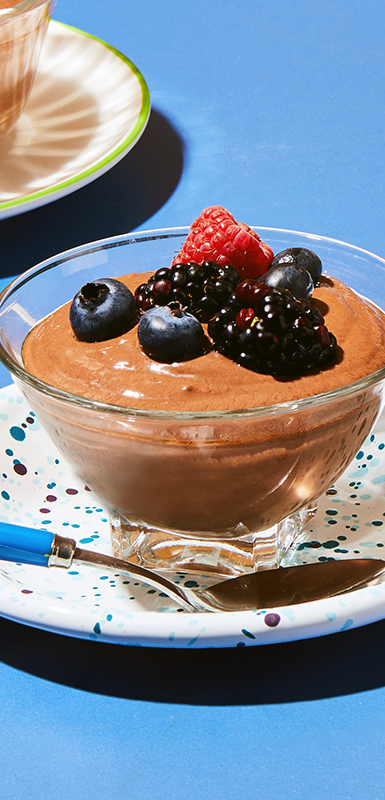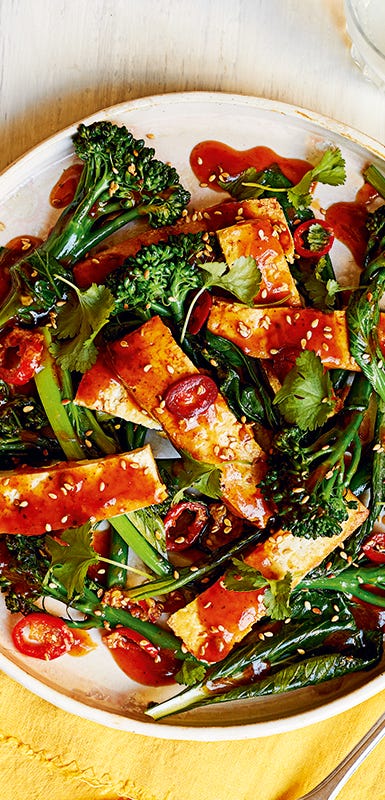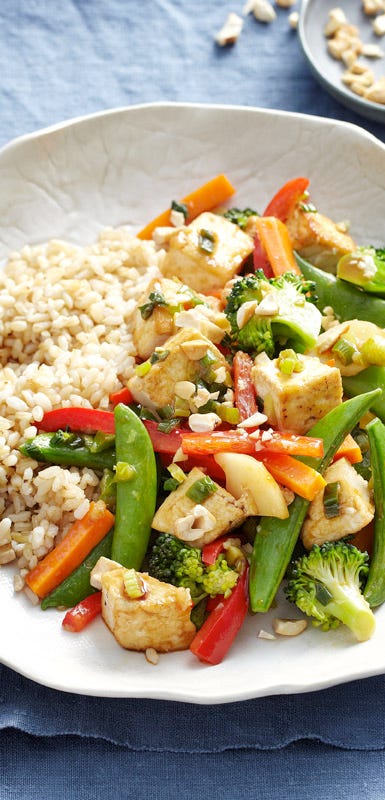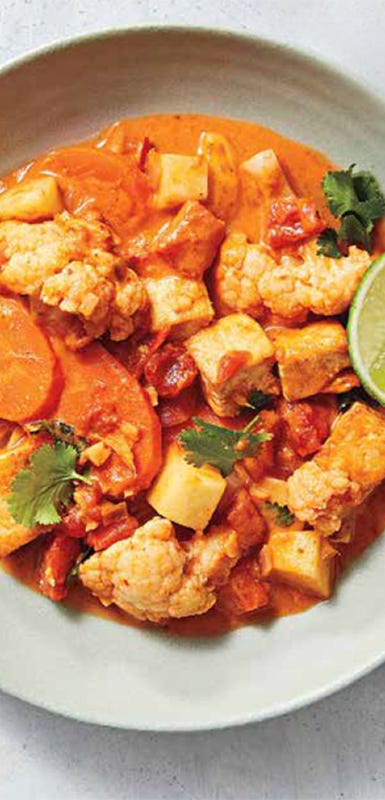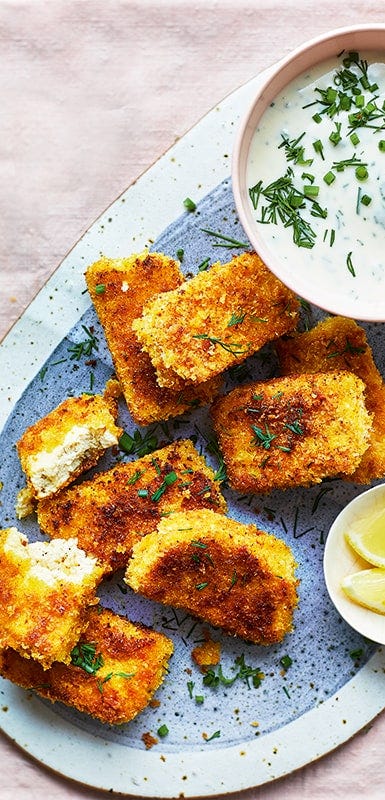Tofu: What is it and is it good for you?
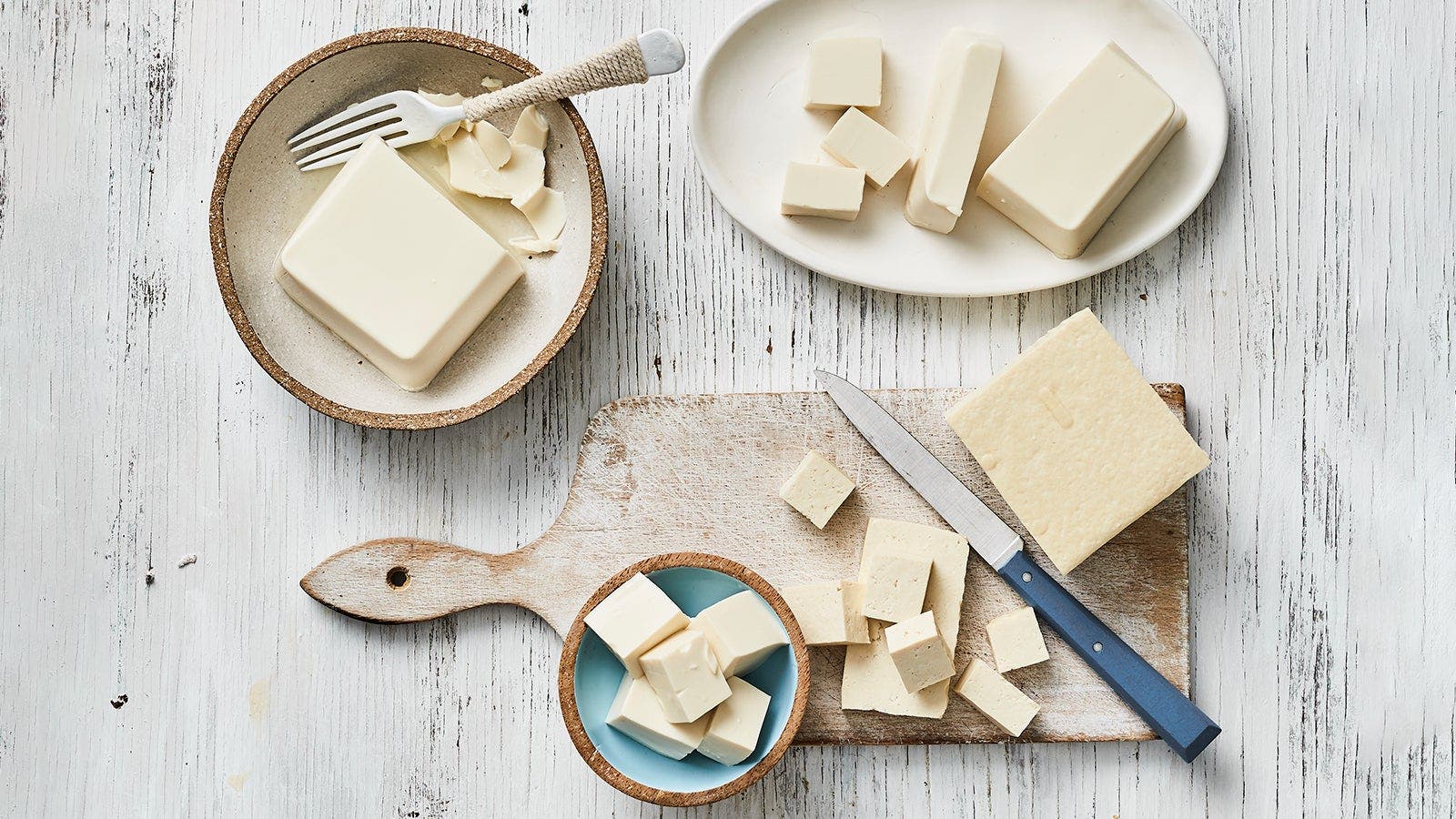

Maybe you’ve heard that tofu is healthy, but you don’t have the first idea what to do with it. Or maybe you feel like chicken and steak on the regular and think tofu is for people who totally avoid animal foods. No matter why you’ve shied away from tofu in the past, there are lots of reasons to put it on the menu.
Tofu, a traditional Asian food made from coagulated soybeans, is a major protein source for many vegetarians and vegans. But people who eat animal foods also use it as a healthier replacement for meat or dairy. And since it’s quite inexpensive, easy to cook with and packs a ton of health benefits, it’s an excellent addition to your meal plan.
If you’re new to tofu, it’s normal to find its texture and flavour a little intimidating. Give it a shot anyway, as nutritionists say tofu is extremely versatile, since it can be used in sweet and savoury dishes and soaks up any flavour you add to it.
When plant-based dietitian Alexandra Caspero first started cooking with tofu, she didn't know what to do with it. But now? “It’s almost foolproof. It’s an inexpensive way to stretch your dishes and add healthy, lower-fat protein for few calories.”
Beyond being good for weight management, tofu may offer a few other health benefits. All soy foods, including tofu, contain isoflavones, which act like weak oestrogens in the body. Since high levels of oestrogens are linked to some hormonal cancers, this raised concerns in the past that soy might increase the risk of certain cancers, especially breast cancer. However, the research to-date suggests that tofu and other whole soy foods may actually have the opposite effect and offer other health benefits, including reduced risk of heart disease.
Read on to learn more on what tofu is, how it’s made, and what science has to say about the health benefits of eating tofu.
What is tofu and how is it made?
Tofu is a protein-rich food made by coagulating soy milk from liquid to solid and pressing it into blocks. It’s thought to have been invented in China some 2000 years ago, when fresh soy milk was accidentally mixed with nigari salt—a bitter salt extracted from seawater.
Production is similar to homemade cottage cheese or paneer, Caspero says. Soybeans are soaked in water, ground, boiled, and strained to make soy milk. Calcium or magnesium salt is added to coagulate the milk; then it’s pressed and set into blocks, explains Vandanda Sheth, a dietitian who specialises in vegetarian nutrition. Tofu can be silken or soft, firm or extra firm—each of which is used differently in cooking.
Some people are concerned that the soybeans used to make tofu are genetically modified organisms (GMOs), or foods with DNA that has been altered by humans. While nutritionists say GMOs are safe to eat, they’re hesitant to weigh in on any health claims about GMOs. If you’re concerned, simply opt for organic tofu.
Tofu nutrition facts
Soy is a rich source of minerals like calcium, selenium and iron. Gram for gram, tofu has a little more calcium than milk: 120 mg of calcium per 100 ml of skim milk, compared to 320 mg per 100 grams of tofu.
In one 75 gram serving of tofu, you get about 85 calories (356 kJ) along with:
- Protein: 9 grams
- Calcium: about 24% of your recommended dietary intake (RDI)
- Manganese: about 15% AI (adequate intake)
- Selenium: about 6% RDI
- Iron: 12% RDI
- Small amounts of zinc, copper, and phosphorus
*Based on the nutrient reference values for adult females
Tofu calories
Tofu is an ideal food if you’re trying to keep your calories in check, since one 75 gram serving has about 85 calories. That’s ~25% less than the approximately 116 calories (485 kJ) in a 65 gram serving of lean beef, grilled tenderloin steak.
Tofu protein
If you’ve always associated tofu with vegetarianism, it’s for good reason, as soy is one of very few plant foods that’s a complete protein. In other words, unlike most other plant foods, tofu contains all nine essential amino acids that your body needs. Even if you’re not a vegetarian, you can still benefit from adding tofu to your diet—especially if you trade it for red meat, which is higher in calories and saturated fat.
While the benefits and risks of saturated fat have been debated in nutrition circles in recent years, the Australian Dietary Guidelines still recommends aiming for just 10% of your daily calories from fat to come from saturated fats in order to reduce the risk of heart disease.
One 75 gram serving of firm tofu provides about 9 grams of protein and just 0.7 grams of saturated fat.
Is tofu “healthy”?
Like all plant proteins, tofu is cholesterol-free and low in fat. Tofu is a source of calcium, manganese, iron, selenium, copper, zinc and phosphorus. Soy also stands out from other legumes because it has more heart-healthy unsaturated fat and more high-quality protein. As part of a plant-based diet, tofu may lower LDL cholesterol and reduce the risk of coronary heart disease and type 2 diabetes.
Like all soy foods, tofu also contains isoflavones—which have a similar but weaker effect than the hormone oestrogen. Researchers have looked into many different potential health benefits of isoflavones, including soy’s potential to reduce breast and prostate cancer risk and menopausal symptoms, such as hot flushes.
It’s very difficult to prove that a specific food is responsible for a particular health benefit as nutrition studies with a control group are typically short (often a few months). Longer-term studies over many years don’t have a control group of people (those receiving a placebo), but they help scientists identify links between what people eat and their longer-term health. “The Asian diet is very high in soy foods, and across the board there’s a lower incidence of hormonal cancers, like breast and prostate cancer, and heart disease,” Caspero says. This, however, doesn’t prove that soy alone is the factor responsible for this protection–other things that scientists didn’t measure may also be contributing. What do scientists agree on? “Eating more plant-based protein is better for overall health, and the data seem to bear that out over and over again,” Caspero says.
Best of all? You don’t have to go vegan or vegetarian to reap the benefits of tofu, Caspero says. Swapping in more plant protein, such as tofu, for animal protein like beef, pork, and chicken can be beneficial to health.
Potential health benefits of eating tofu
1. Boost heart health
Adding more tofu to your daily meal plans is an easy way to take care of your heart. This heart-protective benefit might be because soy foods like tofu are also a great source of polyunsaturated fats and fibre, and may be replacing the saturated fat in red or processed meats, which improves overall diet quality. What’s more, a number of studies have found that eating soy protein may help lower levels of ‘bad’ (LDL) cholesterol in your blood, which lowers your heart disease risk.
2. Protect breast health
Increased oestrogen levels have been linked to breast cancer, and the isoflavones in soy have an oestrogen-like effect in the body. That led to some concerns that soy could increase the risk of breast cancer. The isoflavones in whole soy foods, however, are much weaker than the oestrogen made by our bodies. In fact, soy is linked to a decreased risk of breast cancer, particularly in Asian women, according to the American Cancer Society.
“You hear the word oestrogen and get nervous, because you know too much can fuel cancer cells. But phytoestrogens can have the opposite effect,” Caspero says. “The vast majority of research shows it’s not only safe but probably protective.”
That said, experts suggest that women with a family or personal history of cancer opt for moderate amounts of whole soy foods like tofu (along with tempeh, edamame, miso and soy milk) over soy supplements. Animal studies indicate that the higher concentration of isoflavones in supplements might trigger breast tumour growth, particularly in higher-risk women.
3. Reduce prostate cancer risk
Men in Asian countries have a significantly lower risk of prostate cancer, possibly because they eat a lot more soy foods like tofu.
One review of 30 studies found that men who ate more soy foods had a reduced risk of developing prostate cancer. The isoflavones in soy collect in the prostate, where their weak oestrogen-like effect may protect against cancer. A number of studies continue to look into the potential effects of isoflavones on prostate cancer risk.
4. Support bone health
Oestrogen helps keep women’s bones strong, and oestrogen levels decrease during menopause—which is why women’s osteoporosis risk increases later in life. Since isoflavones act like oestrogen in the body, some women eat more soy foods or take supplements hoping to make their bones stronger.
So far, the research hasn’t backed the theory that soy isoflavones slow bone loss after menopause. But since soy is also a good source of calcium and protein, both of which are important for strong bones, regularly eating tofu may help support bone health.
5. Reduce diabetes risk
Lower oestrogen levels during menopause affect blood sugar control. A six-month study in post-menopausal Taiwanese women found that soy isoflavones lowered fasting blood sugar and insulin. Other research found neither soy protein nor soy isoflavone supplementation had a favourable effect on blood sugar control or insulin sensitivity in post-menopausal Chinese women.
A large study of more than 60,000 American men and women did not find a link between eating soy foods and a reduced type 2 diabetes risk—however this same study found that intake of isoflavones from a range of foods and drinks was associated with a "modestly” lower risk of type 2 diabetes. Whilst some promising results have been documented, more research is needed.
6. Protect kidney function
People with diabetes are more likely to eventually develop kidney disease, Sheth says. One review of nine studies suggested that people with kidney disease who consumed soy protein had lower serum creatinine (an indication of better kidney function) than people with kidney disease who ate more animal protein.
7. Ease hot flushes during menopause
Hot flushes are perhaps the most well-known symptom of menopause, and they’re also linked to dropping oestrogen levels. There is actually some evidence that the oestrogen-like isoflavones in soy foods like tofu may slightly help reduce the severity and frequency of hot flushes—although the effect is small in comparison to hormone replacement therapy, and it may take up to a year to achieve maximum benefit.
Tofu and weight loss
It’s hard to stick to a healthy eating plan if you’re always hungry—which is why nutritionists love tofu for weight loss, as it’s low in calories and high in protein, which helps prolong satisfaction after eating.
One study looked at the diets of more than 130,000 American men and women and estimated that 1kg of their weight loss over a four-year period was attributable to eating tofu and soy. While Sheth notes that’s not a huge change, it was statistically significant, and in combination with weight loss from other dietary changes it can make a difference to health if sustained.
Tofu can be an effective weight-loss tool because it:
- May reduce appetite. Tofu is a low-calorie food that’s high in protein, which may help you to feel fuller for longer so you may eat less at meal time.
- May improve the metabolic profile of women with polycystic ovarian syndrome (PCOS). PCOS is a hormonal imbalance in women that can lead to weight gain and increased diabetes risk. One small study in 70 women with PCOS found that taking 50 mg of soy isoflavone supplements daily—which you can get in about 200 grams of tofu—for 12 weeks improved hormone levels and insulin resistance, a precursor to diabetes.
- May help with glucose control. Sheth adds that because women with PCOS are more likely to have issues with insulin resistance, they’re often trying to cut back on carbs. Since one 75 gram serving of tofu has no carbs and 9 grams of protein, it is a good plant-based protein option.
- May reduce weight gain in older women. Weight gain—especially around the midsection—is a common complaint among post-menopausal women, partly caused by changing levels of hormones, including oestrogen. The oestrogen-like compounds in soy foods like tofu might help. One review of studies on soy and isoflavones found that regularly eating moderate amounts of soy (less than 40 grams of soy protein per day) was associated with a slightly smaller waist circumference and lower body mass index in older women, although more research is needed.
How to cook tofu
Tofu works well in many recipes—both sweet and salty—where you’d use dairy or animal protein. While it might seem intimidating to cook at first, tofu is actually easier to prep than many meat products, since you can eat it raw without worrying about food safety issues. The main hurdle is simply learning where to use soft/silken, firm, and extra-firm tofu, then following a few tricks to achieve the right texture. “The benefit of tofu is that it really doesn’t have flavour, so it adapts to whatever type of cuisine you’re trying to make it with,” Caspero says.
Each of the three main tofu textures has a unique cooking application:
Soft or silken tofu
Silken tofu is the softest of the bunch, which is why it’s often used as an alternative to dairy in giving foods a creamy texture and a protein boost. “You’d use it in anything that doesn’t require structure” Sheth says.
Caspero recommends using silken tofu as a base for baked goods like pies or cheesecake. Mix with olive oil, apple cider vinegar, and herbs like dill, oregano, and thyme to make a lighter version of ranch dressing. Soft tofu is also great blended into smoothies, soups, desserts and sauces.
Firm tofu
If you’re brand new to tofu, Caspero says firm tofu is your best bet. “It tends to be the most diverse in terms of what you can use it for,” she says. Both firm and extra-firm tofu retain their shape when cooked and work just about anywhere you’re looking for a plant-based alternative to meat or poultry.
The key to a good firm tofu, always press out the water first by wrapping it in paper towel, then place a heavy pot or pan on top of it for 10 minutes. “The moisture seeps out, which means your tofu will be crisp when seared and can infuse with marinade,” Caspero says.
Sheth says firm tofu is an excellent replacement for eggs in tofu “scramble” or animal protein in egg or chicken salad. You can also throw firm tofu cubes into a curry or stir fry, bake it in the oven, or skewer it with vegetables on a kebab.
For a heartier, spongy fried tofu taste without the frying, Caspero suggests freezing tofu in its package, then thawing and cooking in a wok to make tofu nuggets.
Extra-firm tofu
“Extra-firm means it’s really hard, so it will hold its shape best when it’s baked or stir-fried,” Caspero says.
Treat firm or extra-firm tofu like chicken breast in just about any recipe. In a stir-fry, sear tofu in a wok to create a crust, then remove and add veggies. When the veggies are cooked, add the tofu back in with your sauce and mix. You can also cover tofu in sauce and bake it in the oven with veggies, or cube it and air-fry it with seasoning or marinade. “Once it’s in the frying pan, it’s ready in 5 to 6 minutes,” Caspero says.
Need more inspiration? Try these recipes:
The upshot: Should you eat tofu?
Tofu is a cholesterol-free, low-calorie, high-protein food that’s also rich in bone-boosting calcium and manganese. Tofu may help you to lose weight by keeping you fuller for longer on fewer calories than meat. It may reduce the risk of heart disease, especially when swapped for saturated fat-heavy animal proteins. Soy foods like tofu also contain isoflavones, which act similarly in the body to oestrogen. This means regularly eating tofu may lower the risk of certain hormonal cancers, including breast and prostate cancer, and diabetes, as well as possibly reduce the symptoms of menopause.
Not a vegetarian or vegan? Don’t worry! You don’t have to abstain from meat to enjoy the health benefits of tofu. Swap firm or extra-firm tofu 50/50 or 100% in recipes calling for chicken, beef, or pork; soft or silken tofu is an excellent dairy replacement in smoothies, soups, and sauces. Since tofu is super-versatile and takes on whatever flavour it’s cooked with, it’s a simple and tasty way to lose weight and support your overall health.


